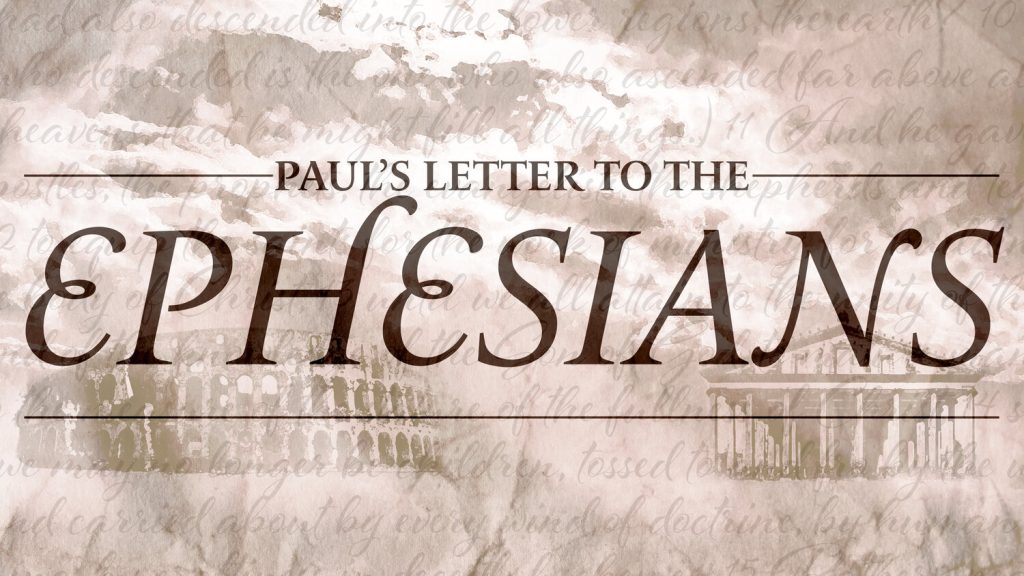We are not gathering this evening with the impending arrival of Tropical Storm Debby. When we reconvene next week, we will discuss Ephesians in general and read through Ephesians 1:1-14. This section has Paul’s brief salutation and opening blessing of praise. Sometime this week, please take the time to read through the entirety of the letter so that you can have a better sense of its overall structure and purpose.
The Centrality of Praise:
The opening discourse by Paul (vv. 3-14) begins and ends with a stress on praise. Paul repeatedly uses words such as “blessing,” “praise,” and “glory.” Paul assumes that his audience knows the story of Jesus (v.15), and therefore he is not making an argument for Jesus. Rather, this opening is a panegyric (or a pep rally) for Jesus Christ so that his audience becomes enraptured with wonder, love, and praise for Christ and his works. Paul wants his audience and us to be excited about Jesus and his role in our salvation. In writing this opening of praise, Paul draws from both Greco-Roman rhetoric and the Hebrew Psalms (e.g., Ps. 96, 118). The remainder of Ephesians will be based on the emotion Paul seeks to enkindle in his audience and us.
The Centrality of Christ:
As we read through this introductory hymn of praise, and throughout all of Ephesians, notice the centrality of Jesus Christ. Jesus, not us, is the main character. The words “ in Christ” or “in him” occur more in Ephesians (21 times) than in any other book of the New Testament, and appear upwards of twelve times within the opening panegyric. Our reconciliation with God and with one another and the fruit of the reconciliation happen only when we are “in Christ.” Therefore, when Paul writes about blessings (v.3), election (v.4), and predestination (v.5), it is Christ who is blessed, elected, and predestined. When Paul writes about redemption and forgiveness (v.7), revelation (v.9), reconciliation (v.10), and receiving an inheritance (v.11), it is Christ alone who makes this possible for us. We who are in Christ are merely the recipients of these blessings, so that, as Paul will later write, no one may boast. Eph. 2:9. Paul will spend the remainder of his letter working out what “in Christ” looks like, but it will generally signify being within the assembly of the faithful followers of Jesus, i.e. the church. The blessings obtained through Christ are not ours individually, but corporately as the Bride of Christ.
The Trinitarian Structure:
Finally, as you read through this opening hymn of praise, notice its Trinitarian structure and how Paul builds the trajectory of salvation within the Trinity. All things have their genesis in God the Father. v.3. Everything that occurs within this hymn, begins with the Father and the exercise of the Father’s will. The Father is not simply a watchmaker who winds the cosmos up and lets it run, but purposefully carries out his free divine will for the reconciliation of all things. vv.10-11.
It is Jesus Christ who is the agency of God’s will. It is through Christ that all things were created. John 1:3, Col. 1:16. Therefore, it is through Christ that all things will be redeemed and reconciled. vv.7, 10.
Paul ends his panegyric with an appeal to the Holy Spirit. vv.13-14. The salvation, reconciliation, and other blessings that we receive from the working of the Father’s will through Jesus Christ, are sealed with the Holy Spirit. The present gifts that we receive by being in Christ will be fully perfected in the future, and the Holy Spirit guarantees this occurrence. Also, see, John 14:15-31
Hope to see everyone next Tuesday. Stay safe and dry.
Were I a nightingale, I would act the part of a nightingale were I a swan, the part of a swan; but since I am a reasonable creature, it is my duty to praise God. This is my business; I do it; nor will I ever desert this post, so long as it is permitted me; and I call on you to join in the same song. Epictetus, Discourse, I.16


Pingback: Ephesians 1:15-19, The Prayer of Thanksgiving – Ancient Anglican
Pingback: Ephesians 1:3-10, God’s Plan – Ancient Anglican
Pingback: Ephesians 3:2-13, Excitement for the Gospel – Ancient Anglican
Pingback: Ephesians 3:14-17, Sanctification – Ancient Anglican